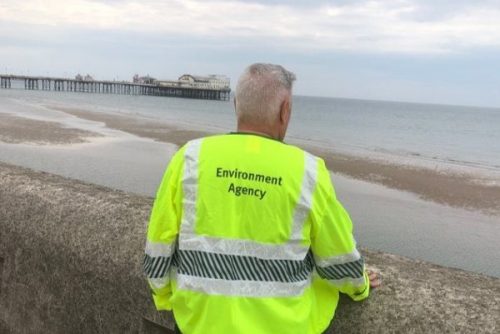United Utilities ‘keeping pace’ to fix Fleetwood waste pipe with 200 engineers on site

As United Utilities officers brace themselves for a public meeting with businesses and angry residents in Blackpool tonight, the company has shared details of its civil engineering programme aimed at fixing a fractured pipe at a wastewater treatment plant at Fleetwood.
The company claims to have more than 200 engineers from eight different suppliers across the UK and Europe working 24/7 on the pipe.
The company also insists that pipe does not pump raw sewage into the sea, but carries treated, clean water 5km out to sea.
“The pipe fracture itself did not release any sewage or treated wastewater into the sea,” a spokeswoman said.
“The fractured pipe cannot pass full flows out to sea which means the treatment plant is running at a reduced rate until the pipe can be restored to normal operation. In turn, this has led to reduced rainwater storage levels in the sewer network along the Fylde Coast which drains to the Fleetwood plant.”
The company has been battered reputationally with campaigners like Feargal Sharkey blaming corporate greed and negligence.
As reported by TheBusinessDesk.com yesterday, the utility company has been the target of widespread anger on the Fylde coast as the holiday season gets going.
United Utilities insists it has acted quickly and responsibly saying it notified the Environment Agency and the local councils straight away on Sunday 11 June when the pipe fractured and since then have been re-routing wastewater across its network and carrying out tankering operations to reduce levels at Fleetwood.
An Environment Agency spokesperson said: “As part of the multi-agency response we are working closely with United Utilities to minimise the impacts to people and the environment, which is our priority. Polluting our seas and rivers is unacceptable and we are carrying out a detailed investigation into this incident. We take tough action against those who pollute and will take appropriate enforcement action, as required.”
The UU spokeswoman told TheBusinessDesk.com: “We currently have 100 tankers removing around 17 million litres of water a day, the equivalent of seven Olympic-sized swimming pools a day, and this is allowing us to keep pace with the sewer flows during dry conditions without any spills into the sea.
“However, on Monday 12 June and Sunday 18 June, heavy rainfall caused storm overflows to operate along the coast leading to precautionary ‘no swimming’ advisory notices being put in place by the local authorities.”
The civil engineering project to fix the pipe involves constructing a bypass, using 2 kilometres of pipework, using 200 engineers from eight different suppliers across the UK and Europe working around the clock to join up 200 individual pipe segments and tighten more than 4,000 bolts. Some of the engineers are from the oil exploration industry.

Mark Garth
Mark Garth, Director of Wastewater Services at United Utilities, said: “Our teams are continuing to work 24/7 at Fleetwood treatment works and the 2,000-metre bypass pipework is continuing to pass flows around the fractured section of pipe. Repairs to the fractured pipe are now under way and our tankering operations are continuing to support the repair process by creating extra storage in the drainage network. Recent rainfall (Sunday 25th and Monday 26th) was contained without any further overflows into the sea.
“The decision about when the precautionary ‘no swimming’ advice along the Fylde Coast can be lifted will be made by the Environment Agency in due course.”
Garth, who had a rough interview with Nick Robinson of the BBC Radio 4 Today programme on Thursday 22 June, also said: “Storm overflows are a legacy of the way that sewer systems across the world were designed over 100 years ago, with the same pipework removing a combination of both rainwater and sewage. Overflows operate when there has been very heavy rain and combined sewers are inundated with rainwater. At these times, overflows act as a safety valve that stops sewers backing up and flooding homes and businesses.
“We are committed to delivering a step change in performance to reduce the operation of storm overflows, which is a particular challenge here in the North West. This region has the largest combined sewer network in the UK, and it is one of the wettest regions, meaning the North West’s sewers have to deal with more rainwater than other parts of the country.
“We have already reduced spill frequency by 40 per cent since 2020 but we know there is more to do and we are planning a £3 billion programme of work across the North West to tackle the issue. We have been granted approval to fast track £900 million of environmental improvements over the next two years.”








